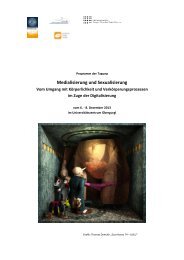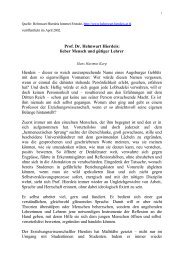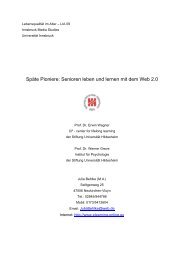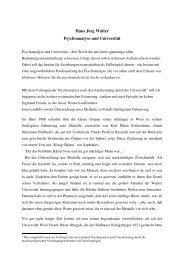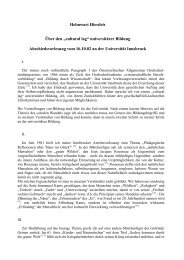Download pdf - Universität Innsbruck
Download pdf - Universität Innsbruck
Download pdf - Universität Innsbruck
Sie wollen auch ein ePaper? Erhöhen Sie die Reichweite Ihrer Titel.
YUMPU macht aus Druck-PDFs automatisch weboptimierte ePaper, die Google liebt.
42 Katharine Sarikakis<br />
pressions of selfishness are standing antagonistically against each other: on the one hand,<br />
the exchange of files for the purpose of not paying as a simply individualistic act and motivation<br />
clashes with the selfish profit-making drive of ‘big business’. On the other hand,<br />
the ‘sharing’ of which each party talks about is much distanced from the notion of passing<br />
on, selflessness and generosity. These moral considerations may provide an additional<br />
layer to the debate on sharing, a concept that often seems to be capitulated rhetorically for<br />
purposes that may seem oppositional to each other, but actually represent the same motivational<br />
ground, albeit at a totally different scale. The image of the selfish opportunist user<br />
(who harms the livelihood of the creator) is nevertheless the one dominating image in<br />
public anti-piracy campaigns and the core framing utilised by the music and film industries<br />
in particular. In their own campaigns, industries are presenting sharing as an act of<br />
deprivation, decrease and reduction, despite the fact that physically, digital cultural products<br />
are neither reduced nor decreased, indeed, as Lessig suggests, their copying does not<br />
constitute an act of copying anymore (2006). The conflictual relation of abundance of<br />
digital goods – at the point of consumption – and effacement of physical conditions – at<br />
the point of their production – is an interesting and telling dimension in the copyright and<br />
privacy wars that constitute the basis of the governance of sharing.<br />
I discussed or pointed to three worrying developments that are taking place in the field of<br />
sharing and the domain of communicative action of users on social media: the appropriation<br />
of private data; privatisation of online public and common spaces; criminalisation of<br />
individuals’ behaviours. As new conditions of usage ‘evolve’ through technological ‘push<br />
and pull’ of the user, it becomes vital for private companies that new ways of thinking<br />
about privacy do not confront the problem of access to personal data and habits. Compound<br />
to that is the establishment of new definitions and management directions of copyright<br />
that expand the range of ownership of social media industries, while shrinking the<br />
terrain of privacy of their users.<br />
The user is thus confronted with a complex system of regulatory prescriptions and technologies<br />
that restrict her claim to ownership (of his information or over the degree of publicness<br />
of the forum one is engaged in). They expand the range of unlawful activities<br />
whereby only certain items can be shared, under specific conditions. Finally, the shapers<br />
of these conditions act fast, at unsuspected moments and at a gradual pace or in various<br />
strategies of shock (such as the case of anti-piracy campaigns) that leave users at a position<br />
of reaction or resignation towards them. It is important that the concepts and practices<br />
of sharing and connecting on social media are reclaimed for their original or authentic<br />
intentions of their users. At the same time, it is important that the power to determine the<br />
fate of value-producing personal information returns to its rightful ‘owners’: us, all. Not<br />
only to have the moral right of authorship over feelings and habits shared, but also to have<br />
lost control over the fate of this information is important for giving back the users a little<br />
of their power as they ‘sit’ at the negotiating table of eternal digital life and their big<br />
brother.



